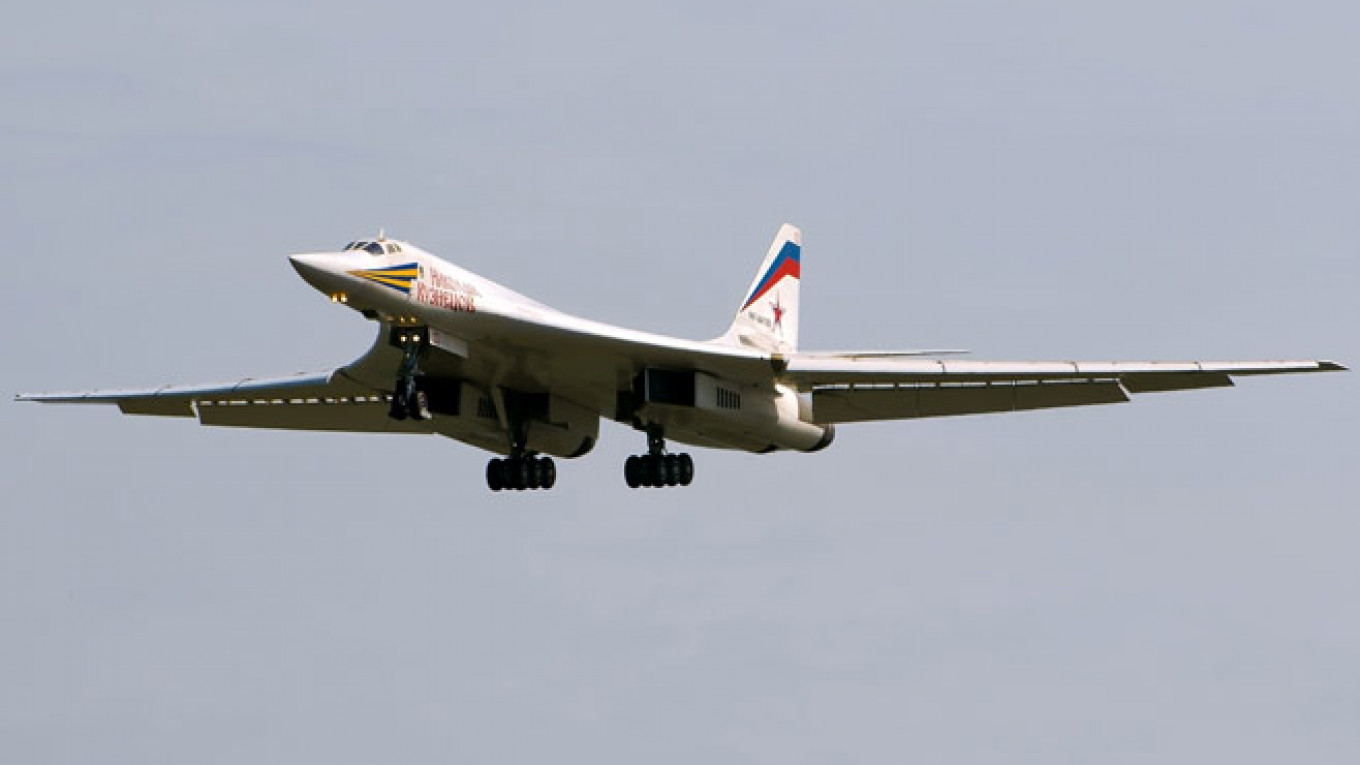Russia will relaunch assembly of the massive Soviet-designed Tu-160 supersonic strategic bomber after 2023, a Russian defense official said, raising questions over the fate of a next-generation bomber program that was meant to enter production around the same time.
But although the Soviet design will be resuscitated, the bomber's innards will be upgraded, Deputy Defense Minister Yury Borisov, who is responsible for weapons procurement, said late last week, news agency RIA Novosti reported.
"This will be essentially a new airplane, not a Tu-160 but a Tu-160M2," he said. "According to the plans, this will most likely happen sometime after 2023."
The announcement comes as Russia aggressively ramps up defense spending under President Vladimir Putin, who has sought to restore the country's military power following years of low funding.
After Moscow's annexation of Crimea last year sparked a confrontation with the West over Ukraine, Russian bomber patrols, including Tu-160s, have repeatedly flown along European airspace.
The Tu-160 was the last bomber designed and built by the Soviet Union. It is a supersonic swept-wing aircraft designed to deliver nuclear weapons to distant targets. Only 15 were produced before the fall of the U.S.S.R., and one produced in the early 1990s.
Since then, some of the existing planes have been modernized, but the Tu-160 production lines at the Kazan Aviation Plant have been silent. Russian military officials had said recently the airplane — dubbed "the White Swan" by the Russian air force and Blackjack by NATO — would go back into production, but have been vague about the launch date.
Last week, the commander in chief of the Russian air force, Viktor Bondarev, said that the Defense Ministry would purchase at least 50 of the new Tu-160s after production is restarted, RIA reported.
The timing of the Tu-160's revival raises questions about Russia's commitment to the PAK DA program, a Defense Ministry project to create a brand-new next-generation strategic bomber. Officials have said the plane would begin rolling off production lines around 2023.
The PAK DA was billed as a replacement for the Soviet-built Tu-160s. Bondarev said last week that production of the new Tu-160s would go hand in hand with production of the new bomber, but committing to both projects would be costly.
With Russia's oil-dependent economy in crisis and economists expecting a sluggish recovery, the country's ability to finance ambitious defense projects may weaken.
United Aircraft Corporation, the state-owned aviation industry conglomerate that would be responsible for building the airframes of both aircraft, declined to comment on the status of either project.
Increased defense spending is already boosting Russia's air power. The country's fleet of 130 MiG-31 supersonic bomber interceptors are being upgraded, and the air force said in December it would receive 150 new airplanes and helicopters in 2015.
This order includes bulk buys of Su-30 multirole fighters, MiG-29s air superiority fighters, Su-24 fighter bombers, and Su-35 fighters — all part of Russia's front-line aircraft fleet.
The air force is currently modernizing the 16 old Tu-160s already in service with new engines and electronics, but Borisov said the Tu-160M2 would feature "new performance characteristics and new features," such as digital electronics allowing for "completely new possibilities."
Maxim Kuzyuk, the CEO of Technodinamika, a Russian state-owned aviation components holding, declined to comment on the status of the Tu-160M2 project, but said the company is ready to produce components for the planes if the orders are made.
"The holding produces a wide range of systems and components for Tu-160s," Kuzyuk said. "We are ready to resume production of the landing gears for this aircraft [and] can continue production of these systems and components, or develop new systems, as well as an [auxiliary power unit], if this task is set," he added.? ?
Contact the author at m.bodner@imedia.ru
A Message from The Moscow Times:
Dear readers,
We are facing unprecedented challenges. Russia's Prosecutor General's Office has designated The Moscow Times as an "undesirable" organization, criminalizing our work and putting our staff at risk of prosecution. This follows our earlier unjust labeling as a "foreign agent."
These actions are direct attempts to silence independent journalism in Russia. The authorities claim our work "discredits the decisions of the Russian leadership." We see things differently: we strive to provide accurate, unbiased reporting on Russia.
We, the journalists of The Moscow Times, refuse to be silenced. But to continue our work, we need your help.
Your support, no matter how small, makes a world of difference. If you can, please support us monthly starting from just $2. It's quick to set up, and every contribution makes a significant impact.
By supporting The Moscow Times, you're defending open, independent journalism in the face of repression. Thank you for standing with us.
Remind me later.


